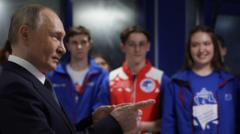In a surprising pivot during a recent address in Murmansk, Russian President Vladimir Putin emphasized the significance of cooperation with the United States regarding Arctic developments, notably highlighting Donald Trump's past interest in Greenland. Rather than expressing criticism toward the U.S. ambitions, Putin adopted a tone of openness, asserting that Russia is prepared to strengthen its economic ties with the U.S. in the resource-rich Arctic region.
**Arctic Ambitions: Putin’s New Perspective on U.S. Relations**

**Arctic Ambitions: Putin’s New Perspective on U.S. Relations**
Amid intensifying geopolitical competition, Putin advocates for economic collaboration with the U.S. in the Arctic.
At the Arctic Forum in Murmansk, Putin noted, "America's plans regarding Greenland are serious," and suggested that the U.S. would continue to pursue its geopolitical interests aggressively. Despite the backdrop of Russia's ongoing military conflict in Ukraine, Putin, alongside his envoy for foreign investment, Kirill Dmitriev, conveyed a willingness to explore investment opportunities in logistics and various sectors favorable to both nations. Dmitriev stressed that economic discussions could only flourish post-conflict, signaling a cautious yet optimistic approach to U.S.-Russia relations.
The Kremlin's interest in Arctic cooperation comes at a time of shifting political sentiments in the U.S., especially with the former Trump administration's perspectives resurfacing among certain American officials. As some in the West express skepticism towards Russia, Dmitriev's focus on fostering economic dialogues highlights a significant desire for a cooperative future, despite existing tensions.
Local Russians in Murmansk, while engaging with an artistic inflatable whale installation that symbolizes the region's ambitions, expressed mixed feelings about cooperation with the U.S. Although sentiments about America as a 'friendly country' varied, the overarching consensus among locals revolved around the necessity to enhance Arctic development through partnerships.
As discussions continue, the Kremlin appears dedicated to leveraging its rich Arctic resources while navigating a complex geopolitical landscape, maintaining hope for a constructive economic dialogue with the U.S. as it eyes a multi-polar world where Russia can assert its influence.
In closing, seeking economic collaboration may pave the way for a more nuanced approach to U.S.-Russian relations, with the Arctic emerging as a focal point of shared interests. As both nations eye the region's potential, the future remains uncertain but intriguingly hopeful.
The Kremlin's interest in Arctic cooperation comes at a time of shifting political sentiments in the U.S., especially with the former Trump administration's perspectives resurfacing among certain American officials. As some in the West express skepticism towards Russia, Dmitriev's focus on fostering economic dialogues highlights a significant desire for a cooperative future, despite existing tensions.
Local Russians in Murmansk, while engaging with an artistic inflatable whale installation that symbolizes the region's ambitions, expressed mixed feelings about cooperation with the U.S. Although sentiments about America as a 'friendly country' varied, the overarching consensus among locals revolved around the necessity to enhance Arctic development through partnerships.
As discussions continue, the Kremlin appears dedicated to leveraging its rich Arctic resources while navigating a complex geopolitical landscape, maintaining hope for a constructive economic dialogue with the U.S. as it eyes a multi-polar world where Russia can assert its influence.
In closing, seeking economic collaboration may pave the way for a more nuanced approach to U.S.-Russian relations, with the Arctic emerging as a focal point of shared interests. As both nations eye the region's potential, the future remains uncertain but intriguingly hopeful.





















